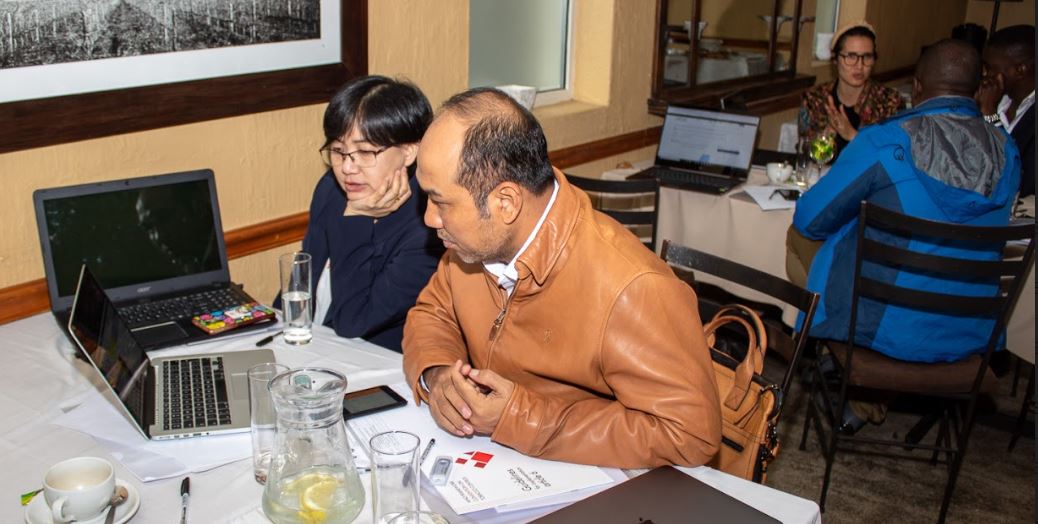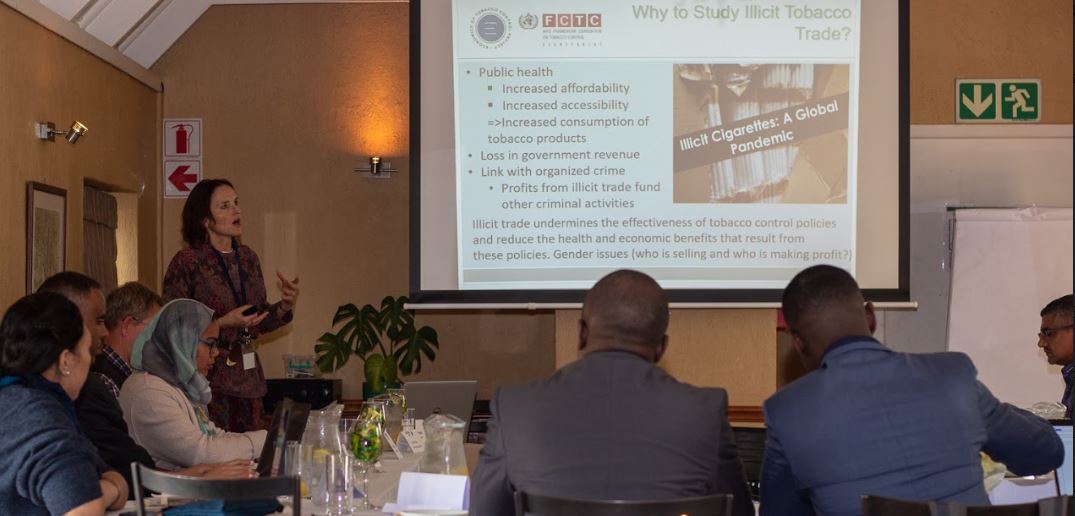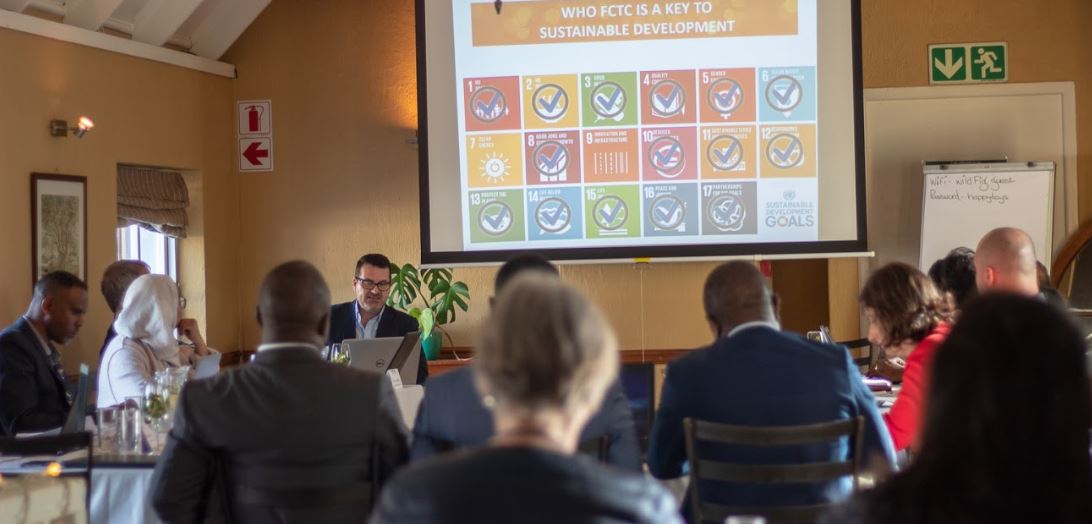Most of the training and technical support conducted by REEP is done under the banner of the Knowledge Hub on Tobacco Taxation.
The Knowledge Hub facilitates workshops and training for government officials (and sometimes employees from civil society organisations) from a variety of countries on specific topics. Such training is offered to Parties from around the world through the Knowledge Hub's global network. This training covers topics such as: how to design an efficient tobacco tax system; how to measure the size and/or trends in illicit trade in tobacco products; how to model the likely impact of a change in the excise tax on tobacco consumption, smoking prevalence and tax revenue; and the like. Read more here.



To find out how to apply to attend/host a KH Workshop, please visit: https://extranet.who.int/fctcapps/fctcapps/fctc/kh/tobacco-taxation/workshops-and-training
Background
Before COVID-19, we usually ran two in-person training workshops a year. We sent out a call for participation, often through the FCTC Secretariat, to which government officials, civil society organisations and researchers applied. Typically, we invited one person from the Ministry of Health and one person from the Ministry of Finance, from countries that indicated interest. In some instances, members of civil society organisations also attended the workshop. Workshops were attended by delegates from five or six countries (i.e., about ten to twelve people), and usually took place in-person over the course of a week. The number of attendees was constrained by the budget, and by the number of REEP staff that were involved in the one-on-one discussions in the last two days of the workshop.
The first few days consisted mostly of lectures, where basic economic concepts, like demand, elasticity, tax pass-through, tax structure, and industry responses were presented. In the last two days of the workshop, a REEP member assisted each country to develop a country-specific Tobacco Excise Tax Simulation Model (TETSiM), based on the needs and data availability of that country. The results of these models were presented on the last day of the workshop, by the country participants. REEP also assisted the country participants to write an aide mémoire which would outline the next steps for delegates from each country.
In some instances, REEP staff are asked to present training workshops in individual countries. For example, in February 2020 REEP was invited by the WHO country office and government officials to present a training workshop in Cabo Verde. The training was similar to the generic raising that is offered in Cape Town but is more focused on the specific needs of the country. Examples of other in-country training programmes include missions to the Philippines in 2018, Suriname in August 2022, Panama in January 2023, and the Maldives in August 2023.
Current training activities
COVID-19 brought new challenges and opportunities. After the first year of COVID-19, we realised that we could reach a much larger audience by conducting the workshops online. During COVID-19, a typical training workshop took place over a two-week period. In the first week we would have daily online presentations, of about two hours per day. This covered the same material as the work we covered in the in-person pre-COVID-19 workshops. The number of attendees was not limited by venue size or budget constraints. In the first workshop held during the COVID-19 period (14 to 18 March 2022) more than 500 people registered, and at least 200 people attended the online workshop at any given time.
In the second week of the workshop, REEP researchers assisted selected country teams to develop a TETSiM for the team’s country. A country team consisted of between two and ten people. REEP hosted four of these online training workshops.
We realised that there is substantial demand from around the globe for basic training in tobacco taxation. In early 2023 we decided to develop an online course in tobacco taxation, called Tobacco Taxation 101. Unless there is a very specific need, we will not be providing in-person (face-to-face) courses on tobacco taxation at UCT in future. Rather, we will direct delegates to attend the Tobacco Taxation 101 course before we engage with them in, for example, an in-country meeting.
Technical Support
Technical support, as bespoke support for individual countries, is usually provided through the Knowledge Hub on Tobacco Taxation. The aim is to develop capacity among government and CSO officials, and to ensure that the resulting policies are sustainable. The support is not generic (as the training generally is) but aims to address the specific issues that the receiving countries’ officials raise. Most of this support would be in the form of in-country assistance missions, but it could also be remote support.
The training workshops in the past have been an important source of requests for additional assistance from individual countries. More recently, we have issued calls, often through the FCTC Secretariat, where countries can apply for technical support. The technical support is typically tailored to the country’s needs, but there are often commonalities in the requests. For example, there is often a need to develop a simulation model that will help predict the likely consequences of a change in the tax structure and/or level of the excise tax.
The in-country technical assistance usually culminates in the production of a report that summarises the modelling process and outcomes. The assumptions that underlie the results of the TETSiM are verified and vetted by the country officials. The model and the report are given to local officials, who can share them more widely with their colleagues in government. These reports can serve as an input in the policy development process. Occasionally our results and insights have been used by other organisations to assist their in-country support. For example, our modelling has supported the UNDP and the WHO to argue for an investment case for tobacco-control policy in Ghana. The technical assistance missions also allow REEP researchers to establish relationships with members of government, which culminates in establishing influence in government processes.
In addition to the report shared with local policymakers upon completion of the technical assistance, we have a tradition in REEP that the members who conducted the in-country mission write a 2-3 page report on their experiences when they return.
